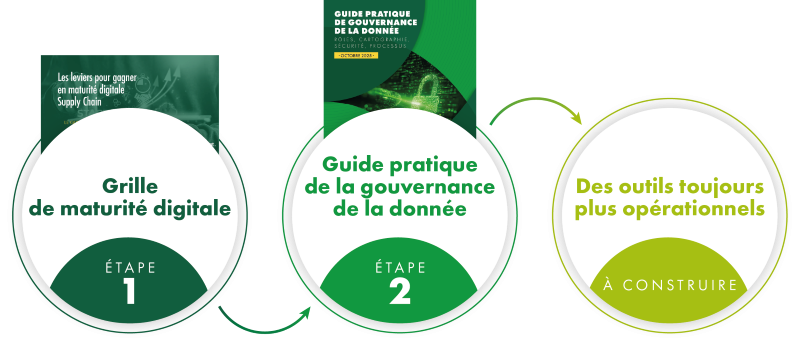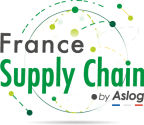
Digitizing better and more: the guide to putting your data under control
The data governance is a powerful lever for improving performance, securing operations and preparing for the future from Supply Chains (AI, automation, compliance, etc.). To reach this level of maturity progressive digitizationof the Supply Chain is essential. Discover in this article the work of the members of LAB Digital et Technologies who who have been working on the subject since 2024, to provide accessible tools even with limited and expertise.
No AI without data
No AI without data
The story began a year and a half ago, with the design of a "digital maturity grid". This resource enables us to define a company's transformation potential a company's transformation progressin complete autonomy (link at end of article).
The major finding of the discussions and design of this 1st guide was: no maximum digital maturity, no logical Event Driven logic (i.e. an augmented operator and a system that acts) without complete complete mastery of its data.

The "maturity grid" squad was transformed in 2025 into a new squad with a focus data governance.
This new group of members is now publishing its practical guide.
Guide reserved for association members

Saad KADIOUI
Partner / Head of IS Transformation CITWELL
"Data quality is key to supply chain efficiency chainData quality is key to supply chain efficiency, but I find that many of my customers have poor control over it. This is precisely where governance plays a central role: although it is often neglected as being restrictive and not very visible in the short term, it is the essential lever for this control. Without it, it's impossible to guarantee reliable data, and the the company misses out on the real opportunities for excellence provided by new data technologies (data science, data platform, AI, etc.).. "

Philippe GOURBEYRE
Supply Chain Owner - Michelin
"Faced with the rapid proliferation of data, the need for responsiveness in decision making, compliance in an increasingly large ecosystem, and opportunities with new technologies (Artificial Intelligence, Machine Learning, ...), Data transformation requires well-defined roles and responsibilities. Setting up governance will enable everyone in the company to understand their role in the data lifecycle and assume responsibility for it."
Pragmatic digitalization accessible to all
Pragmatic digitalization accessible to all
The 2 publications follow the same same guiding principle: to aim for operational practices that are easy to implement. With these tools, the members demonstrate that digitizing the supply chain is accessible even with limited resources, as it is a gradual process (we have included a glossary for the uninitiated).
Two guides offering a pragmatic, step-by-step approach step-by-step, pragmatic approach to structuring yourto structure your practices around pillars.
The 3 pillars of Supply Chain digitalization :

DATA

HUMAN

TECHNOLOGICAL BUILDING BLOCKS
The 4 pillars of data governance :
Clear, recognized roles and responsibilities.
Reliable, shared data reliable and shared.
Safety adapted to uses and regulations.
Management processes controlled, documented and measured.
When we talk about alignment with the field, we're referring first and foremost to tests and implementations of the grid carried out by other squads and members on topics such as S&OP, data governance for CO2, bonded warehousing or AI GEN.
In the context of data governance, recommendations can seem very theoretical and rigid, but here we remind you of the importance of taking into account the reality on the ground. This guide and its pillars must be adapted to your reality.
Being concrete and actionable has always been a priority for LAB. This is also reflected in the availability of techniques and methods methods (diagnostic tables, concrete examples, diagrams) to facilitate implementation in your context.
A guide to mastering your data: a rewarding co-construction project
A guide to mastering your data: a rewarding co-construction project
Let's talk to the guide's editors to understand the importance of this project for organizations.

Olivier Weis S&OP Business Development Manager - Renault Trucks
"In Business Development activities within the S&OP department at Renault Trucks, being able to rely on quality data, i.e. data in which there is a high level of confidence, is essential. This is all the more true where the concept of "Citizen Development" is concerned (i.e. user departments develop their own tools on the basis of the data models made available to them).
Raw or, more often than not, transformed, data is the indispensable cement in the management of our supply chain , and in the decision-making process. That's why data governance processes, which are increasingly solid, structured and documented, are becoming more and more important, enabling us to make better use of our data on a daily basis.

Delphine CUVELLIER French Customs Manager - ALSTOM
"When we think of customs, the first thing that comes to mind isn't necessarily data. However, we are also impacted by digitization, which is changing our practices and professions, and this is only the beginning. We are at the dawn of a data-driven revolution, which is redefining not only our tools, but also the interactions between public and private players. That's why I wanted to take part in this work.
In the customs field, this transformation is accelerating thanks to the transposition of the Union Customs Code (UCC) into data and the imminent arrival of the European Data Hub. These developments mark a strategic turning point: data is becoming an essential lever for performance, compliance and anticipation.
For customs authorities, the challenges are many and varied. Firstly, to intelligently target goods flows by detecting anomalies and fraud risks, such as undervaluation or inconsistencies in declarations. Improving service performance, by providing an overview of an operator's exchanges. And combat illicit trafficking by exploiting massive data with the help of artificial intelligence.
For economic operators, data is also becoming a strategic tool. It enables them to anticipate protectionist measures and adjust sourcing strategies. It facilitates the integration of customs regulations and associated costs into the supplier selection process. And it helps secure supply chains and optimize international flows.
It's always a great pleasure to share and exchange ideas on key subjects, and I hope that this collaborative work will be of use to other professions."



